January 8, 2024
How to Set up a PTO Tracker in Google Sheets
If you’re running a business or managing a team, you need a way to track annual leave, sick leave and other...
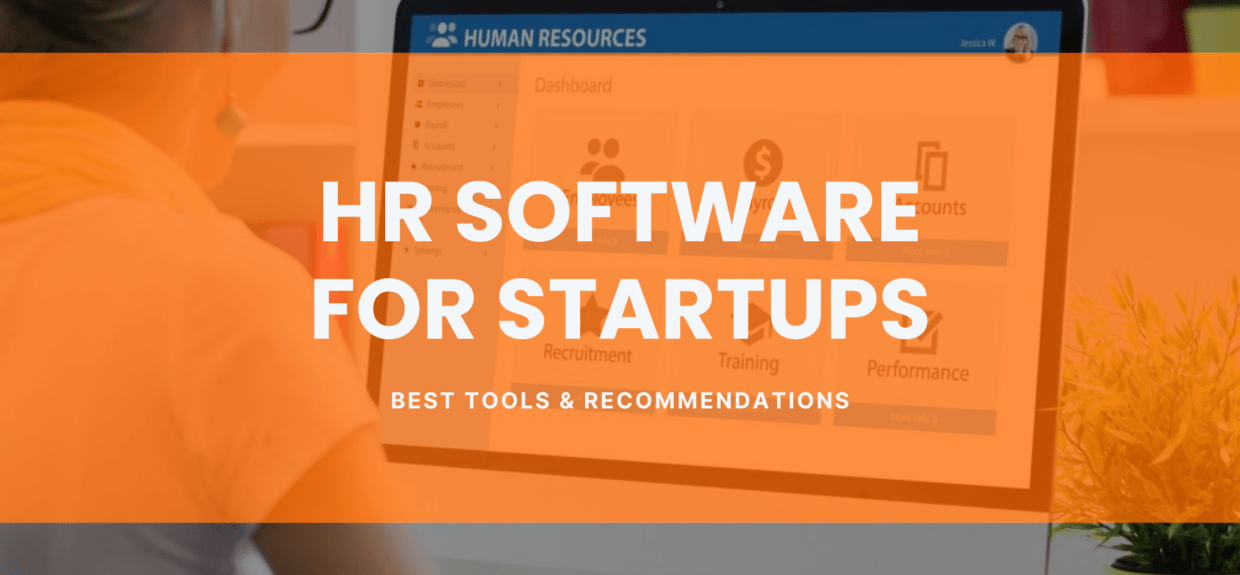
In this post we’ll run through all the best and most essential HR software for startups and small businesses.
HR software is a game-changer for a small business. When you’re running a new business or a business with a limited headcount, you need to find ways to automate things that bigger companies have dedicated teams for.
Human resources, with a lot of time-consuming admin work, is one of the first places you should look for automation. Read on and we’ll look at some of the best tools for the job, with our list of the best HR software for startups and small businesses in 2024.
Read More: 37 Remote Work Tools for Modern Startups
Let’s start by looking at what kind of things HR teams are responsible for, specifically in small and medium businesses.
The HR department needs to store and manage employee data.
This covers all kinds of employee information, such as their name, starting date, role, contract, employee benefits and remuneration, contact information, tax information, and more.
All this information needs to be readily available for the right people (such as HR managers, department managers or senior management), while being secure enough that it’s not leaked or available for anyone to view.
Alongside employee data storage, you need to store all your company’s policies and processes, and make them available when needed.
Examples include your employee handbook, leave policy, work from home policy, along with SOPs (standard operating procedures).
The HR department needs to store and manage these documents, and may also be responsible for creating said documents too.
Employee management tasks, such as training and development, may be done by individual departments rather than HR. But in a small business, you’re less likely to have siloed departments, so this will likely end up being managed across the board for all roles.
HR needs to keep records of all training and development done within the company, along with any certifications held by employees.
Your company needs to track each step of the hiring process, from job posting through to the onboarding process.
This is important for setting up efficient hiring procedures (cutting down the cost it takes to recruit and train employees), ensuring there’s no bias, conscious or unconscious discrimination in your hiring process, and making a clear list of the paperwork you need from each employee before they get to work.
HR is responsible for making sure the company complies with all relevant laws and regulations.
This includes health and safety, employment laws, employee records and more.
Larger companies may have a dedicated finance team for this, but in a small business or startup, the payroll process generally comes under HR.
On top of payroll management, HR is responsible for managing benefits, such as paid time off and giving out fringe benefits, and expense management.
Employee management comes under the banner of HR too. This is very broad – from maximizing employee engagement and incentivizing top performance, to following up with low performance and conducting disciplinary procedures.
When discussing HR software tools, a wide range of different types of software can come under this banner.
There are many tools out there that function as a complete HR solution. They’re essentially an automated HR department in and of itself, with modules to cover more or less all of the tasks we listed above.
You’ll still need at least one human to manage these HR solutions, but they drastically cut down the legwork required to run an HR team.
An HRIS, or human resources information system, is not drastically different from the full-stack HR software. It’s a (generally) cloud-based HR software used to store all key employee and organizational information.
This could honestly be as simple as a Google Drive containing all relevant information, or a custom-built HR software platform.
Employee payroll software stores all employee salaries, tax information and historical payroll data, and automates the payroll process each pay period. This kind of HR software is extremely valuable for the time it saves, as well as the reduction in human error compared to manually handling payments to staff.
These HR software tools enable startups to set goals, track performance, conduct performance reviews, and provide feedback. They help align employee objectives with company goals and enhance performance measurement.
You need an HR software solution to track attendance and/or absences in your business.
For a lot of modern companies, you don’t need so much of the attendance tracking side. You may not feel it’s important to have employees clock in and out and track the exact time they work. But you do need to track planned absences (such as leave/vacation), and unplanned absences, such as sick leave.
Even if you only hire people once or twice a year, an applicant tracking system will come in good use. This kind of HR software helps you compare different applicants, make sure you cross off all the important
These tools assist in managing employee benefits programs, such as health insurance, retirement plans, and leave policies. They help automate benefits enrollment, track employee participation, and communicate benefit-related information.
LMS tools help deliver and manage employee training programs, onboarding materials, and professional development resources. They enable startups to create and track training modules, assessments, and certifications.
There are a number of great HR software tools available today. From full-stack HRIS (Human Resources Information System) tools, to smaller tools like employee engagement tools or vacation tracker apps, you should definitely be using something from this list in your business.
Without anything further, here are the best HR tools today, based on our experience running multiple bootstrapped startups.
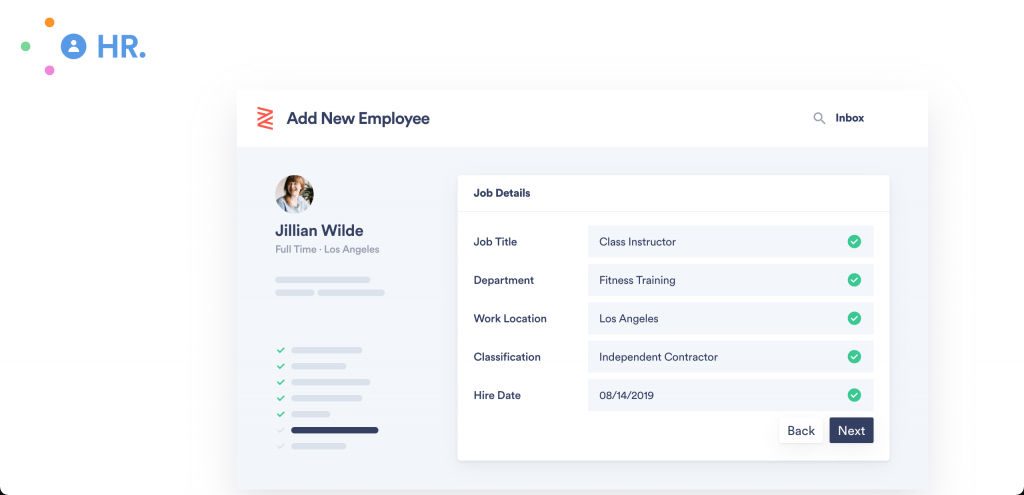
Zenefits makes HR easy for startups and small businesses that can’t dedicate staff or teams to manage tasks like onboarding, payroll, and benefits tracking.
It makes things simple and easy for your entire team by syncing HR, payroll, and scheduling, all within one platform.
Zenefits claims that their customers spend 90% less time on payroll and benefits, and 50% less time on onboarding after they start using the service.
That means less time spent on less productive tasks, and more time dedicated to product development, marketing, PR, etc.
Here are a few of the core HR features of Zenefits:
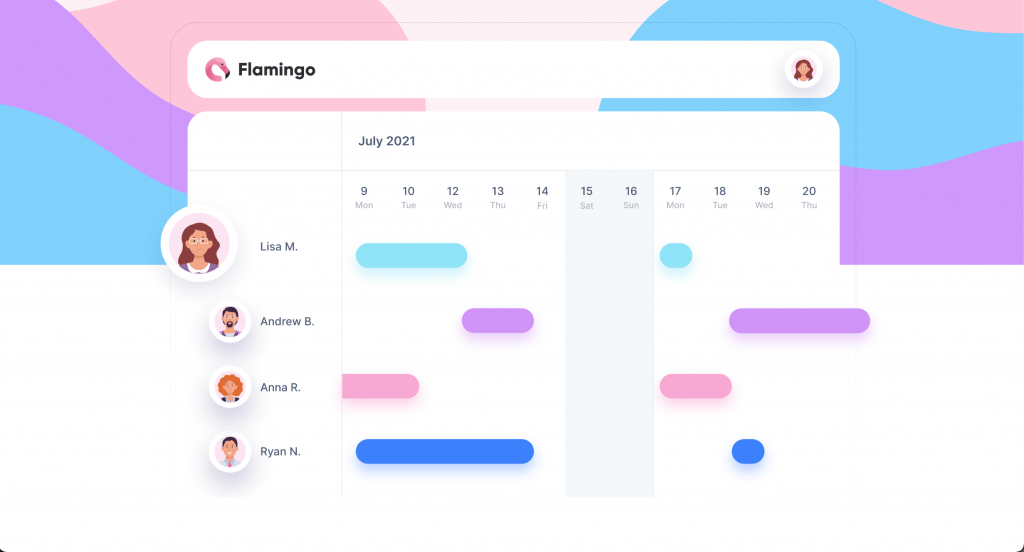
Flamingo is a Slack app that simplifies your HR workflow. With Flamingo, staff can plan and request leave right from your company’s online HQ. Managers can approve or deny leave in the same place, sending a quick response to the employee.
Flamingo creates an easy to view vacation calendar, so those in charge can quickly see who is available, and who has vacation days or other leave types scheduled.
It also has an employee self-service portal within Slack, where staff can view and manage their past and upcoming leave requests, their outstanding leave balances, and make new leave requests.
Improper leave management not only saps managers’ or HR staffs’ time, it can also result in scheduling conflicts, short-staffing, loss of productivity and unhappy staff.
If you’re on Slack, it’s a no-brainer to add Flamingo to your workflow.
Flamingo streamlines leave management, letting you spend less time managing paid time off and more time growing your business
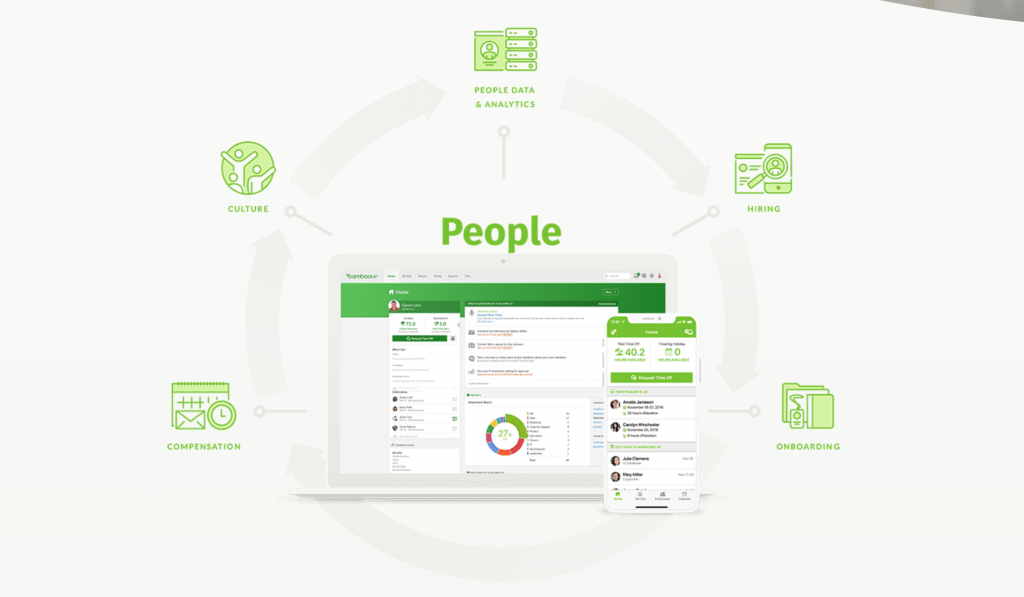
If you’re a looking for a combination of a traditional HRIS system and modern HR tools, Bamboo HR may be the right HR software for you.
Bamboo HR will help you gather data throughout your employee’s life cycle at your company. Whether it’s recruitment, onboarding, compensation, or implementing company culture.
Here are some of the key benefits of Bamboo HR for a startup or small business.
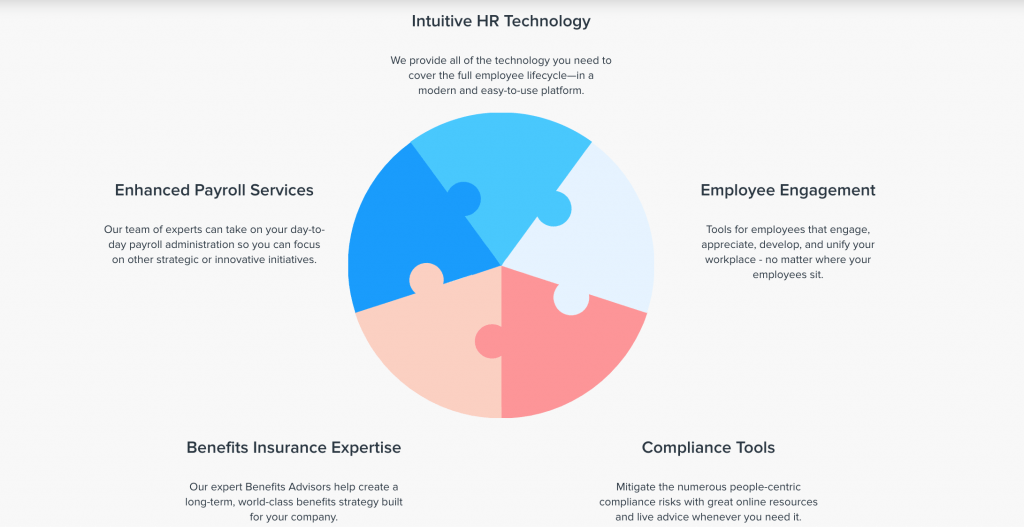
We get it. Running HR for a mid-sized business isn’t for the faint of heart. Namely is here to give you the tools to make your life easier and your employees happier.
Namely is better suited for slightly larger teams.
If your team is around 50-100 people, you might still only have a couple dedicated HR staff. If you’re in this boat, Namely is one of the best HR software solutions to make these peoples’ jobs easier.
Here are some of the key benefits for small businesses that the Namely customers enjoy the most.
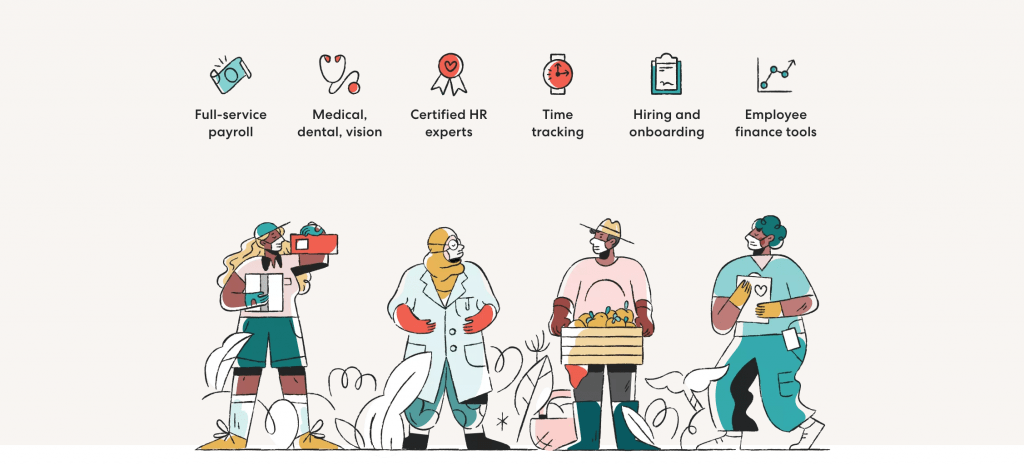
Gusto focuses on simplicity, and makes it easy for you to onboard new hires, pay them, track their benefits, and provide any necessary support to your hardworking team.
Onboarding can be a breeze with Gusto because of their customizable checklist. Here are a few examples of what’s offered.
You can handle payroll with Gusto as well. Once you set up an employee within the system you can do the following with a few clicks.
Gusto helps you manage health benefits for your team. If you already have benefits set up, Gusto can help you move everything over into their system, so it’s all in one place for your convenience.
You can set up the following benefits in Gusto.
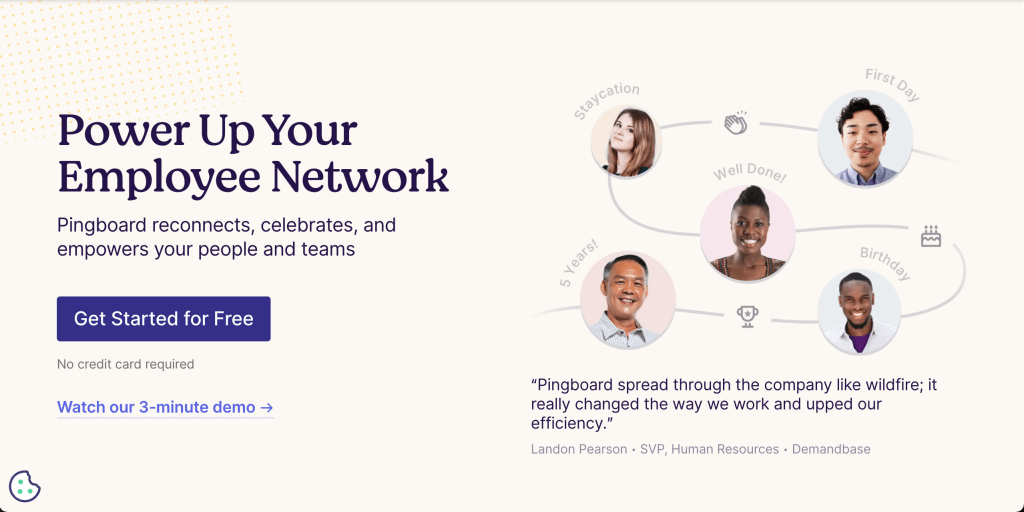
Pingboard is all about empowering your employees. Another tool that is suitable for larger teams, especially remote teams with employees across several different locations.
Pingboard facilitates networking within your organization in a way that promotes employee engagement and a sense of belonging.
Pingboard helps you be transparent and eliminate silos, leading to more empowered, efficient, and better-working teams. Learn how our beautiful employee directory, org chart, and integrations help everyone from leadership on down have the context to work better together.
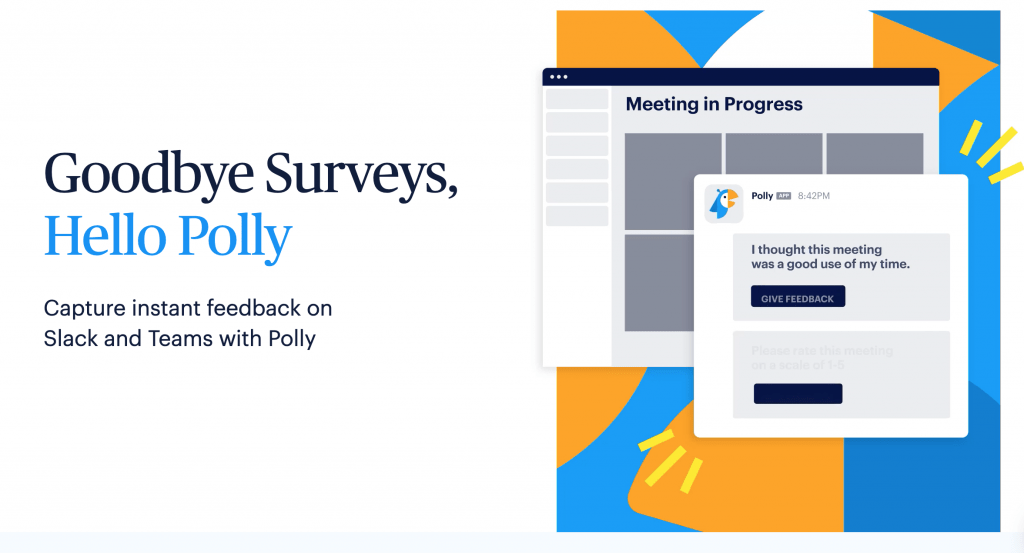
Polly is an HR tool that integrates with Slack and Teams to collect instant feedback from your remote team employees across various locations.
Easy to use with features that allow you to create feedback templates in a matter of seconds, Polly is an instant engagement tool that makes meetings more lively, and it makes your employees feel like they have a voice within the organization.
Some of the key solutions that Polly offers startups and small businesses are the following.
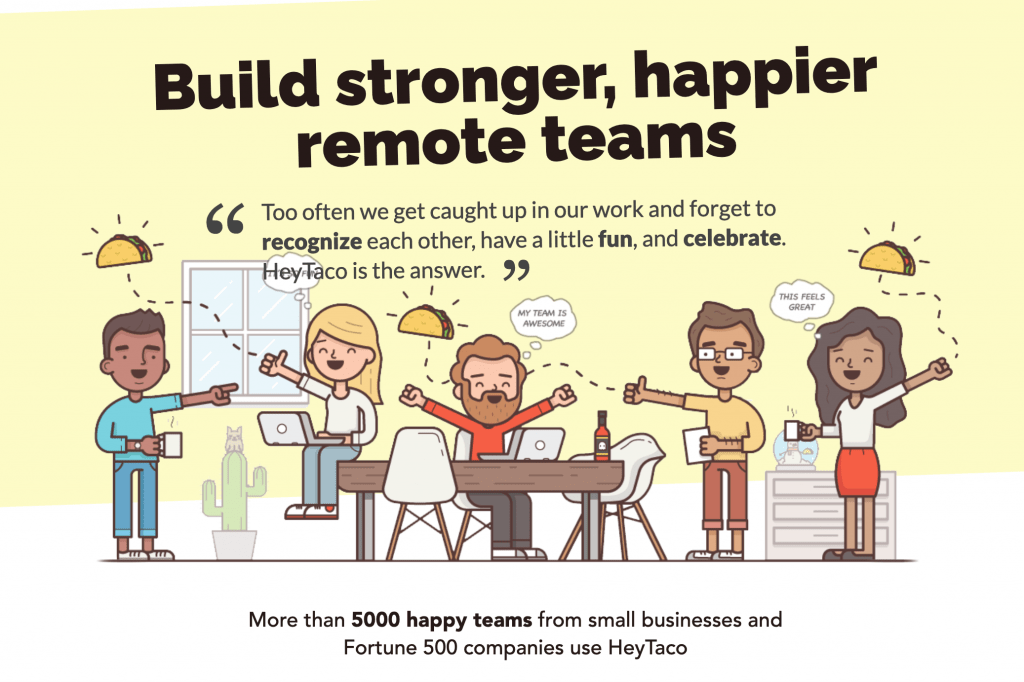
Sometimes, it’s about having a little fun. It can go a long way in building team morale and creating a sense of togetherness.
And that’s where HeyTaco comes in.
HeyTaco is an HR tool that helps you build stronger and happier remote teams. It helps your team celebrate successes, recognize each other, and have a little fun.
These things can be invaluable especially for remote teams where team members can miss out on the small interactions that you’d find in a traditional office setting. The water cooler hangout, so to speak.
It May seem too simple to be effective, but it adds a layer of fun to work interactions, and ultimately boosts employee morale, and makes it a pleasant experience to work with each other.
Here’s how it works.
HR software solutions can do so much for new companies or those with a low number of employees. They allow you to get by with fewer permanent employees – you may still have HR professionals or HR managers on your team, but they’ll be able to cover the same amount of ground that you’d need multiple full-time staff to do otherwise.
Here’s a quick rundown on the benefits of HR software for startups.
HR software allows you to automate a lot of repetitive HR tasks. These tasks can be extremely time-consuming, sapping away productivity, as well as the energy of your team.
Ideally, anything that can be automated should be automated. This frees up more time to be spent on more important tasks that require a human touch.
Saving time is not only good for productivity, it’s good for your bottom line. All the time HR staff or managers spend on mindless admin work is time you need to pay for. And these are usually among the higher-paid members of your team.
It’s a big win for profitability if you can get the same amount of work done from fewer working hours.
Humans make mistakes. Even experienced, certified HR professionals make human errors every now and then. Computers don’t.
HR software ensures greater accuracy, and fewer delays or inconveniences due to routine human error.
HR workflows are often extremely complicated. This makes the job of HR teams very laborious. HR software simplifies this, automating much of the process and saving your team’s headspace for what’s really important.
HR software sets the foundation for all HR-related processes in your business. These processes often need to be done a certain way to ensure your business complies with all relevant regulations and laws.
By using HR software, you can make sure these processes work the same way every time, and you don’t have staff cutting corners that could lead to legal issues in the future.
Using HR software as the backbone of your small business is convenient for everyone involved. You know that information is always going to be there – you don’t need to wait around for a specific person to be in the office to give you the information you need.
A lot of the time, you might want to check on something (such as a policy, or your paid time off balance), without bothering someone else and interrupting their workflow. HR software, particularly those tools with employee self-service portals, allow you to do that.
HR software is also perfect for remote and hybrid teams.
Traditional HR systems are run on the back of paper records, or internal company intranet. This provides a ton of difficulty if you want to take your business remote, or allow a hybrid working arrangement for your team.
HR software makes everything digital, allowing team members to access the tools and information they need from anywhere, and letting you run a truly modern business.
Trending Article: 15 Great Examples of Companies with Unlimited PTO
Every business needs employees. And if you have employees, you need HR.
Whether you have a dedicated human resources department or not, HR software for small businesses is essential. They save you time and help you run a more efficient, fully-compliant business.
The payoff for this is increased profitability, more engaged employees, and a business built to last.
Flamingo makes managing your team’s paid time off a breeze.